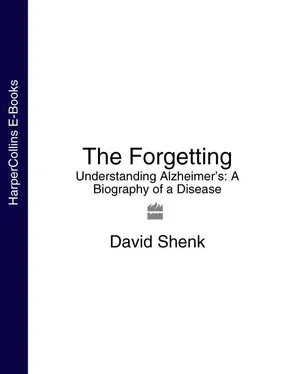THE FORGETTING
Understanding Alzheimer’s:
A Biography of a Disease
DAVID SHENK

William Collins
An imprint of HarperCollins Publishers Ltd. 1 London Bridge Street London SE1 9GF
www.harpercollins.co.uk
Published by Flamingo 2003
First published in Great Britain by HarperCollins Publishers 2002
First published in the US by Doubleday 2001
Copyright © David Shenk 2001
David Shenk asserts the moral right to be identified as the author of this work
Several of the names and identifying characteristics
of the individuals depicted in this book have been changed to protect their privacy.
All rights reserved under International and Pan-American Copyright Conventions. By payment of the required fees, you have been granted the nonexclusive, nontransferable right to access and read the text of this ebook on screen. No part of this text may be reproduced, transmitted, downloaded, decompiled, reverse engineered, or stored in or introduced into any information storage and retrieval system, in any form or by any means, whether electronic or mechanical, now known or hereinafter invented, without the express written permission of HarperCollins ebooks
HarperCollins Publishers has made every reasonable effort to ensure that any picture content and written content in this ebook has been included or removed in accordance with the contractual and technological constraints in operation at the time of publication
Source ISBN: 9780006532088
Ebook Edition © DECEMBER 2013 ISBN: 9780007439669
Version: 2016-09-09
For Lucy
Cover
Title Page
Copyright
Dedication
Prologue
PART I EARLY STAGE
1. I Have Lost Myself
2. Bothered
3. The God Who Forgot and the Man Who Could Not
4. The Race
5. Irrespective of Age
6. A Most Loving Brother
PART II MIDDLE STAGE
7. Fumbling for the Name of My Wife
8. Back to Birth
9. National Institute of Alzheimer’s
10. Ten Thousand Feet, at Ten O’Clock at Night
11. A World of Struldbruggs
12. Humanize the Mouse
13. We Hope to Radio Back to Earth Images of Beauty Never Seen
PART III END STAGE
14. Breakthrough?
15. One Thousand Subtractions
16. Things to Avoid
17. The Mice Are Smarter
Epilogue
Resources for Patients and Families
Sources
Index
Acknowledgments
About the Author
Praise
About the Publisher
LEAR: Does any here know me? This is not Lear.
Does Lear walk thus, speak thus? Where are his eyes?
Either his notion weakens, his discernings
Are lethargied—Ha! Waking? ’Tis not so.
Who is it that can tell me who I am?
FOOL: Lear’s shadow.
—William Shakespeare, King Lear
“When I was younger,” Mark Twain quipped near the end of his life, “I could remember anything, whether it had happened or not; but my faculties are decaying now and soon I shall be so I cannot remember any but the things that never happened.”
At age seventy-two, Twain’s memory and wit were intact. But behind his remark lay a grim recollection of another celebrated writer’s true decline. In December 1877, Twain had come to Boston at the invitation of William Dean Howells, editor of the Atlantic Monthly , to satirize a group of Brahmin intellectuals. Among Twain’s targets that night was the father of American Transcendentalism, Ralph Waldo Emerson.
It was after midnight when Twain finally took to the floor at the Hotel Brunswick to spin his yarn. He told the venerable crowd about a lonely miner who had been victimized by three tramps claiming to be famous American writers. The literary outlaws stormed into the miner’s cabin, ate his beans and bacon, guzzled his whiskey, and stole his only pair of boots. They played cards and fought bitterly. One of the tramps called himself Emerson.
The point of the skit was to poke some harmless fun at Emerson by corrupting some of his noble expressions. As they played cards at the climax of the story, the Emerson hobo spat out contorted fragments of his poem “Brahma.” A mystical paean to immortality, the original included these stanzas:
If the red slayer think he slays,
Or if the slain think he is slain,
They know not well the subtle ways
I keep, and pass, and turn again.
They reckon ill who leave me out;
When me they fly, I am the wings;
I am the doubter and the doubt,
And I the hymn the Brahmin sings.
Twain twisted the verse into drunken poker banter:
I am the doubter and the doubt—
They reckon ill who leave me out,
They know not well the subtle ways I keep,
I pass and deal again.
An elegant master of spoof, Twain was revered around the world as the funniest living man. But on this important night, his material bombed. From the start. Twain drew only silence and quizzical looks, most prominently from Emerson himself. At the finish, Twain later recalled, there “fell a silence weighing many tons to the square inch.” He was humiliated. Shortly afterward, he sent a letter of apology to Emerson.
Only then did Twain learn of the hidden backdrop to his performance: Emerson had been present only in body, not in mind. Emerson’s dead silence and flat affect, Twain discovered, was a function of neither offense nor boredom. As his daughter Ellen wrote to Twain in reply, it was simply that he had not understood a word of what Twain was saying.
At age seventy-four, this was no longer the Ralph Waldo Emerson who had written “Self-Reliance” and Nature; who had said, “Insist on yourself; never imitate”; who had mentored Henry David Thoreau; the Emerson of whom James Russell Lowell had said, “When one meets him the Fall of Adam seems a false report.”
This was now a very different man, a waning crescent, caught in the middle stages of a slow, progressive memory disorder that had ravaged his concentration and short-term memory and so dulled his perceptions that he was no longer able to understand what he read or follow a conversation.
“To my father,” Ellen wrote to Twain of the performance, “it is as if it had not been; he never quite heard, never quite understood it, and he forgets easily and entirely.”
One of the great minds in Western civilization was wasting away inside a still vigorous body, and there was nothing that anyone could hope to do about it.
Taos, New Mexico: March 1999
They came from Melbourne, Mannheim, St. Louis, London, and Kalamazoo; from Lexington, Stockholm, Dallas, Glasgow, Toronto, and Kuopio. From Tokyo, Zurich, and Palo Alto.
Some took two flights, others three or four, followed by a winding three-hour van ride from the floodplains of Albuquerque, up through the high desert terrain of Los Alamos, past the Sandia mountains, past the Jemez volcanic range, past the Camel Rock, Cities of Gold, and OK casinos, up near the foothills of the Sangre de Cristo mountains.
More than two hundred molecular biologists gathered in the small but sprawling city of Taos, amidst the adobe homes and green-chile quesadillas, to share data and hypotheses. This high-altitude, remote desert seemed like a strange place to fight a threatening disease. But specialists at the biannual conference “Molecular Mechanisms in Alzheimer’s Disease” needed a refuge from their routine obligations.
Читать дальше













